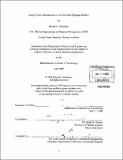Supply chain management in the dry bulk shipping industry
Author(s)
Nicholson, Bryan E. (Bryan Edward)
DownloadFull printable version (10.03Mb)
Other Contributors
Massachusetts Institute of Technology. Dept. of Mechanical Engineering.
Advisor
Henry S. Marcus.
Terms of use
Metadata
Show full item recordAbstract
This paper is intended to show the importance of supply chain management in the dry-bulk shipping industry. A hypothetical company, the Texas Grain and Bakery Corporation, was created. The values and calculations used are artificial but representative of the industry. A well defined fleet analysis of Texas Intercoastal Transport's vessels and supply chain infrastructure show that an increase in productivity and profitability are possible with proper implementation. A systems approach of tying together the subsidiaries of Texas Grain and Bakery is used. This analysis is broken into seven sections: (1) Overview of the Systems Approach, which breaks down the seven step process. (2) Establishing a Baseline, which shows an annualized view of cargo movement of the core trade based on the first half of 2005. (3) Analysis of "Ideal" Allocation of Current Fleet, which defines assumptions used in the model and proposes a core trade fleet. (4) Analysis of Intermediate Fleet Allocation, which is a fleet analysis executable within the next 18 months. (cont.) (5) Analysis of Long-Term Fleet Allocation, which is a fleet analysis executable around 2009. Two new-build vessels are added into the core trade along with sharply increasing the amount of grain moved. (6) Analysis of Delays, which goes over historical data from the Texas Intercoastal Transport fleet that warrants further future study. (7) Conclusions and Recommendations, which summarizes the results of the seven step process and makes recommendations for implement ion of results into the core trade of Texas Grain and Bakery. The paper concludes with several findings. Conservatively, there is an estimated savings of $4 - 6 Million savings per year throughout Texas Grain and Bakery. There are certain inefficiencies that do exist in the system and cannot be remedied; they can only be minimized. Finally, additional study into mechanical delays is suggested in order to further increase fleet productivity and profitability in the future.
Description
Thesis (S.M. in Ocean Systems Management)--Massachusetts Institute of Technology, Dept. of Mechanical Engineering, 2006. Includes bibliographical references.
Date issued
2006Department
Massachusetts Institute of Technology. Department of Mechanical EngineeringPublisher
Massachusetts Institute of Technology
Keywords
Mechanical Engineering.